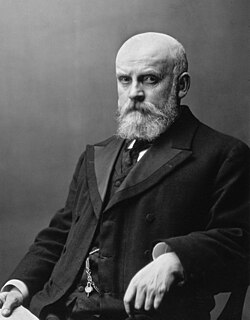John Russell Hind
John Russell Hind (also given in the literature as John R. Hind) (born May 12, 1823 in Nottingham , † December 23, 1895 in Twickenham ) was a British astronomer .
Live and act
Hind was employed at the Greenwich Observatory in 1840 as an assistant in the magnetic department. Here he worked under George Biddell Airy . In 1844 he took part in the expedition to determine the longitude of Valencia in Venezuela.
In the following years he worked as an observer at George Bishop 's private observatory in Regent's Park . Here he discovered a total of ten asteroids and several comets between 1847 and 1854 . The naming of its third asteroid (Victoria) was controversial - until then it was unusual to name asteroids after people who were still alive. Hind pointed out, however, that he had named the celestial body not after the then British Queen Victoria , but after the Roman goddess of victory .
Hind calculated the orbits of 70 celestial bodies ( planets , asteroids and comets). In addition, he also dealt with the observation of variable celestial bodies , where he discovered the deep red, variable star R Leporis in the constellation Hare (Lepus) and the variability of the star μ Cephei in the constellation Cepheus . In addition, he discovered a gas nebula with the star T Tauri in the constellation Taurus (Taurus) , the brightness of which is changeable ( Hind's changeable nebula - the nebula reflects the light of a changeable star). The Nova Ophiuchi discovered by him in 1848 ( V841 Ophiuchi ) in the constellation Serpent Bearer (Ophiuchus) was the first nova of modern times (since the supernova of 1604).
Hind was best known, however, as the editor of the Nautical Almanac , which was important for shipping at the time , and of which he was “Superintendent” between 1853 and 1891.
Honors
Hind received the gold medal of the Royal Astronomical Society in 1853 for his achievements . In 1851 he became a corresponding member of the Académie des Sciences . In 1855 he was awarded the Royal Medal by the Royal Society . In 1863 he was elected a member ( Fellow ) of the Royal Society. The Russian Academy of Sciences in St. Petersburg , he belonged since 1878 as a corresponding member. In 1895 he became an Honorary Fellow of the Royal Society of Edinburgh . On the Paris commemorative coin from 1868, which was minted on the occasion of the hundredth asteroid discovery, Hind is depicted alongside three later multiple discoverers: Hermann Goldschmidt , Karl Theodor Robert Luther and JC Watson .
A crater on the moon ( Hind ) and the asteroid (1897) Hind were named in his honor.
See also: List of asteroids
Works
- Astronomical vocabulary . London 1852
- Introduction to astronomy . London 1863
- On the expected return of the great comet of 1264 and 1556 . London 1848
- The solar system . London 1846
- Descriptive treatise of comets . London 1859
Web links
- Publications by JR Hind in the Astrophysics Data System
- Obituaries for JR Hind in the Astrophysics Data System
- Entry on Hind, John Russell (1823-1895), astronomer in the Archives of the Royal Society , London
| personal data | |
|---|---|
| SURNAME | Hind, John Russel |
| BRIEF DESCRIPTION | British astronomer |
| DATE OF BIRTH | May 12, 1823 |
| PLACE OF BIRTH | Nottingham |
| DATE OF DEATH | December 23, 1895 |
| Place of death | Twickenham |
